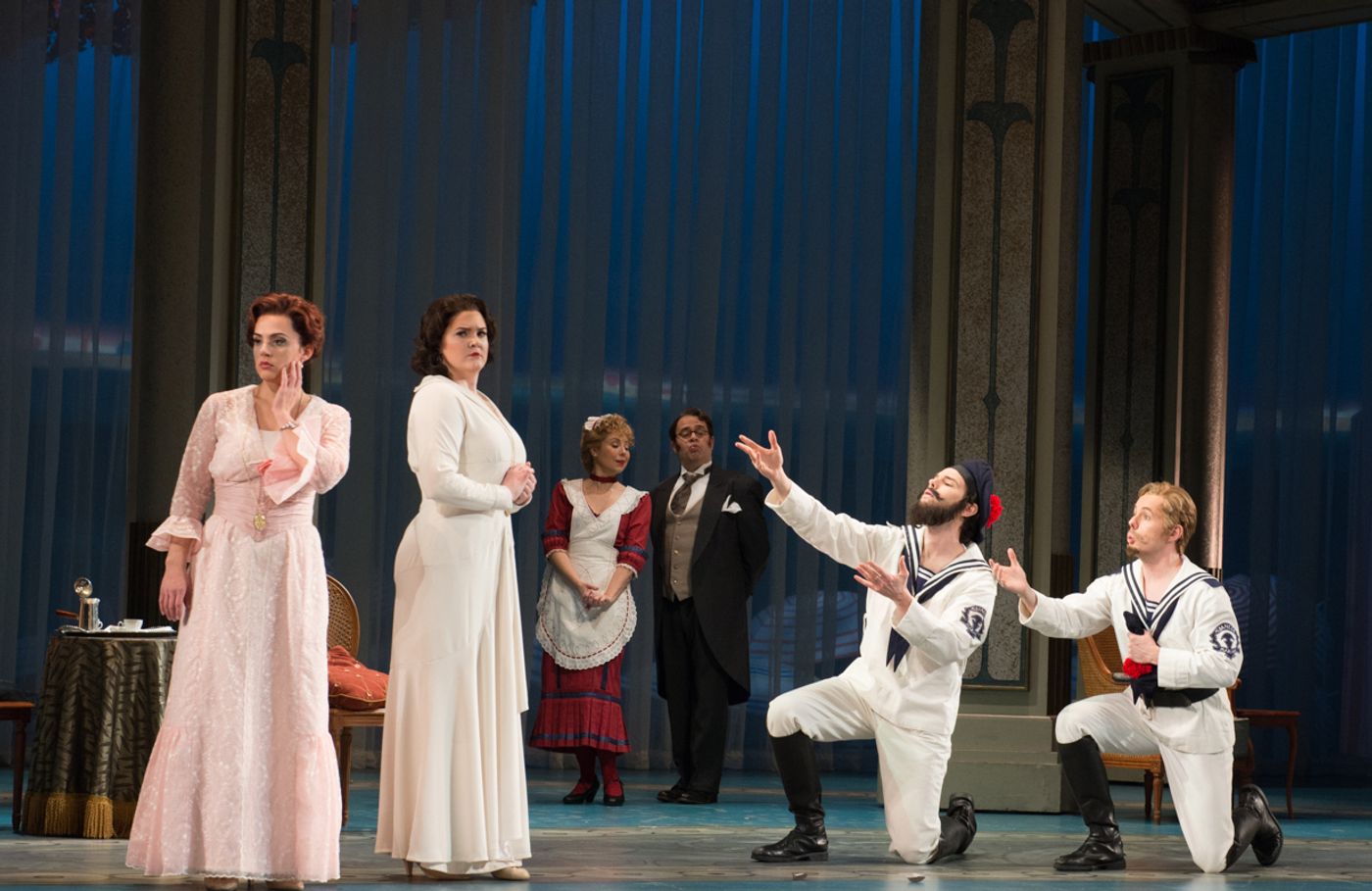Review: COSI FAN TUTTE at KC Lyric Opera
 An odd duck, this Cosi Fan Tutte (fig. "They [women] are all like that"), when viewed through modern eyes. Written as a "Take That" to the romantic idealism prevalent then (and now) - the constant lover, unsullied by temptation, unable even to think of loving another. Mozart and his librettist Lorenzo Da Ponte take great delight in hurling such notions to the ground and dancing on them. In the nicest possible way, of course.
An odd duck, this Cosi Fan Tutte (fig. "They [women] are all like that"), when viewed through modern eyes. Written as a "Take That" to the romantic idealism prevalent then (and now) - the constant lover, unsullied by temptation, unable even to think of loving another. Mozart and his librettist Lorenzo Da Ponte take great delight in hurling such notions to the ground and dancing on them. In the nicest possible way, of course.
In Naples, two sisters Fiordiligi (Rebecca Farley, Sopr) and Dorabella (Daniela Mack, Mez) are deeply in love with soldiers Guglielmo (John Viscardi, bar) and Ferrando (Alasdair Kent, ten). Don Alfonso (Patrick Carfizzi, bar), a man of the world, implies to the two men that their sweethearts are perhaps not as steadfast as they imagine. Incensed, they challenge him to prove it. He has them pretend to march off to war, and woo the two girls in disguise as "Albanians". Within a day, the men (with a little unwitting help from the girls' maid Despina (Maureen McKay, sopr)) find themselves all too successful, and in danger of losing more than just their bet.
The production, originally from the San Francisco Opera, is quite a good one. The belle epoque setting goes awfully well with the material, and the costuming is particularly impressive, especially during the wedding sequence near the end. Really the whole production has a marvellous stylized look about it. The music was under the visiting baton of Jane Glover, CBE, which was rather a treat. We did seem to pick up one or two "oopses" in the music, but no real klinkers.
The principals all turned in fine performances: this reviewer particularly enjoyed hearing Kent & Viscardi together, as their voices blend quite nicely (actually, Guglielmo is traditionally a bass, but Viscardi definitely made the case for baritones last night). Ms. Mack has a fine mezzo voice, and dove right into the "buffa" moments when the story demanded it: see her rendering of "Smanie implacabili". Ms. Farley's rendering of "Per pietà, ben mio, perdona" was a particular treat. And Maureen McKay's job of bringing Despina to life easily made her an audience favorite.
Da Ponte was also the librettist behind Le Nozze di Figaro and Don Giovanni, so it is not surprising to see some of his favorite devices cropping up here. His approach to romance is playful when it's not outright cynical. Lots of mix-ups and surprises. And of course Da Ponte always loves his wily servants, with Despina joining Leporello, Figaro, and so many others throughout the opera world.
So. What is the modern viewer to make of Cosi? A story based on the fickleness of women, engineered by the deception of men, and ending with the moral that you're not going to find anyone better, so you might as well go ahead and love the one with you're with. An eyebrow raiser, to be sure. The humor is the saving grace here: it is so clearly not meant to be taken seriously, so anything that might get one's righteous dander up can easily be laughed away. Of course, this has not always been the case: in the Victorian era, Cosi was often presented in a bowdlerized version, if it was presented at all. And while it does show its age, this reviewer feels that we are sufficiently distant from it, that we can take it on its own terms and laugh without guilt.
A quick note about Despina. She occupies an odd place in the story: bribed by Don Alfonso to set up her mistresses with these "Albanians", she is used by him as part of the plot while never actually being privy to it. A trickster and victim of trickery at once, in fact. In the end of this production, she is literally sent packing. It may have been Ms McKay's sympathetic performance, but one found oneself feeling sorry that she seemed to be the only one to receive any lasting consequences. Indeed Don Alfonso, the instigator of the whole mess, walks away with no more than a slap. One is tempted to use this as a jumping off point for a polemic on the unequal dispensation of justice by social class, but - no. One must forbear. After all, when all is said and done, this is buffa. And the thing about buffa is... well, "they're all like that".
Reader Reviews
Videos

